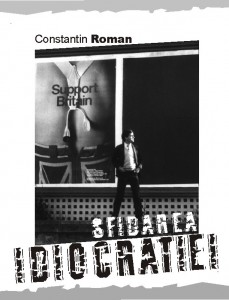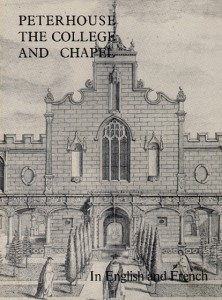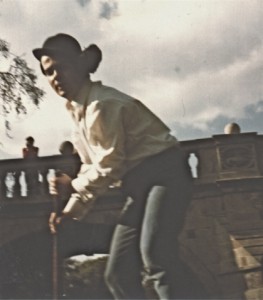17. My Romanian passport, issued in Bucharest for a five-year period, was still valid, but its pages ran out, due to the numerous visas which I had collected during my professional visits to Europe. My Tutor’s persistent letters to the Romanian Ambassador asking for additional passport pages were first ignored, but Roger was not giving up, easily. He sent reminders to the Emnassy in London, again and again, until they realized that the Roman problem will not go away, as it was a casus belli. This caused the Embassy in London to dispatch the Consul to see me in Cambridge. His was intended as a surprise visit, because the Consul came, unannounced, and out of the blue. This was a typical Communist practice! I remember this summer day, as I returned to the Hostel, where my rooms were on the ground floor. I was returning from a job interview and was still pondering over my chances of success. As I opened the door of the Hostel, I bumped into this Continental character, who appeared engrossed in reading, the notice board, the faded notices, which must have been several years out of date. Only a moron will have feigned such an interest and, although I gave the visitor only a fleeting glance, I immediately sensed something suspicious about him, maybe because all KGB officers had a common air about them, even when dressed in civies. My name and room number were inscribed in the lobby, so as soon as I approached the door the stalker identified me. Without looking in his direction I played for time, in opening the door and pretended that I could not find the right key. The man approached and I knew that he came especially for me, as if I always waited for his long-expected visit. I was not in the least surprised when he addressed me in the affirmative, rather than the interrogative:
– Domnul Roman!
It was something ominous about his form of address of Domn (Mister), as opposed to the Marxist idiom of Tovaras (Comrade). It was obvious to him, and inter alia to me, that I had passed the Rubicon and that I was no longer one of them, so he would not address me as Comrade, which would have been the idiom of Communist tribal speak and a prerequisite amongst fellow-travellers. I had never been one of them, but, at least, in Romania, this Comrade bit was how I would have been addressed, as a matter of routine. Should ever anybody have addressed one instead as Mister rather than Comrade, in the ideological speak, this would have been equivalent to a declaration of war. It would have been regarded as an unfriendly opening gambit, suggesting that the two parties were in opposition and that there ought be no doubt who was going to win and who was going to be the loser. How ironic that the word Domn, which was about to be written off from the Communist speak, was of Latin, therefore of Western origin (dominus – Lord, Master), whilst Tovaras was Slav. The latter was an imported word from the East, like the Communist ideology, alien to Romanian people, whose affinities remained firmly in the West.
Subconsciously I always expected this visit, like the agent expecting his Controller. I was not surprised in the least about this shadowy figure appearing from the dark. I put, swiftly, the bunch of keys back in my trousers pocket, without having opened the door, and turned to the visitor in a matter-of-fact manner, as if one addressed an intimate friend:
– Why didn’t you forewarn me?
I had no need to know whom he was: neither had he the need to introduce himself! I never met him before, yet I always knew him, always expected him to turn up from the shadows. He had that indelible mark of the executioner, approaching his prey. It was plain to him that I knew whom he was and that there was no need to ask for his identity. How many hours did he wait for me, reading the faded papers on the notice board, in the lobby? It must have been quite a long time, judging by the length of my morning’s appointment. Now it was one o’clock:
– Let us have lunch!
I told my stalker, as if to prove that life went on, as usual, and that I was not going to change my habits. Besides, there was no need for me to forego lunch, as it might have put me in bad mood. Nor was it advisable to ask him to my rooms, where he would have dearly liked to corner me, like in a mousetrap. Much better to coax him out, to a place where there were lots of people, to see and to be seen. I thought, as my face lit with a smile:
– Let us celebrate the occasion and go public, dear Tovaritch!
–
As we were about to exit the Hostel we stumbled into the Embassy official limo, conveniently parked within inches of the Hostel door:
– No, need to take the car, I said, it is only across the road!
–
I beckoned him to cross the road with me:
– Was it his intention to offer me a lift to some remote gourmet place, where one would be fed on a Marxist diet of borsht Better to postpone such opportunity and go for a College lunch, instead!
We crossed Trumpington Road and although barely a few minutes had passed, since I was confronted with this burly presence, it felt like ages. The time became oppressive, almost laden, yet I had to stay alert, move quickly and keep the initiative. Past the Porter’s Lodge I changed my mind, as I did not want the stalker to find out more about the College geography, for his next visit. Besides, College lunches were brief affairs and hardly any graduates were ever coming in, only undergraduates, whom I knew less well.
We passed the Museum of Classical Archaeology, through Little St. Mary’s Lane, to the Graduate Centre. At lunchtime this was far busier than Peterhouse and I was likely to bump into many friends. I ordered my stalker to a table in the bar and took a place in the queue. I did not bother to ask what he wanted – he had to do the same as me. I scanned feverishly the faces in the crowd. I struck lucky! Richard Adrian was at a nearby table, with a colleague from the Department of Medicine. I rushed to him and said without preamble:
– Richard, I am with somebody from the Embassy!.
–
He knew I was odd and a little excitable. Why should it matter whom I was with? He shrugged his shoulders and smiled. I rejoined the table where my stalker was seated, bringing him sandwiches and a beer.
– What brings you to Cambridge?
– I’ve come to see other Romanian students.
– Are there any in Cambridge, other than myself?
– Yes, there is one in Trinity.
– Good, good! They have a very good Master there, Lord Butler. You know, he is appointed by the Queen. He is a former Minister in Churchill’s Government.
–
I tried to impress him with my contacts, lest he would try to push me around, I might tell good old RAB to tell the Queen… to tell Ceausescu to lay off. My mind wandered a bit, trying to figure out what was his real brief? Was he going to bundle me in the boot of his car, take me to the Embassy, in London and spirit me out of the country? That would be silly, but not impossible! After all, I was a pain in the Embassy’s backside, for all the letters Newcastle and now Peterhouse wrote to them. Better to stop such nuisance! Surely, he was sent to Cambridge to solve the problem and close the file, once and for all. I told him I was researching Carpathian earthquakes. He did not care, why should he? The only potential earthquake he was interested in, was avoiding the one caused by the failure of his mission.
I asked him:
– Have you brought more pages for my passport?
– Why bother? he asked. Better apply for a Romanian Foreign-resident passport.
– Why? Surely, this isn’t necessary! My present passport is still valid. I have no intention of staying abroad, I said coyly, knowing full well that I burnt all my boats home and that my parents were no longer allowed to come to visit me in England. All I want is to finish my doctorate and for this you will have to extend my re-entry visit to Romania and send a few more pages for my existing passport.
Asking for a Romanian passport of a citizen residing abroad had specific implications and political connotations I had best avoided: better extend the status quo! The stalker did not expect this determined retort. He lost the initiative and he could not squeeze me between the Hostel door and the diplomatic car boot, as we were, in a very public place, in full view of everybody. He would have to seek fresh instructions from the Centre.
I thanked him for his visit and I reassured him that:
– The Senior Tutor would be interested to know that he had called and he will write soon to this effect.
–
He protested:
– This was not necessary!
– Quite the contrary, I reassured him, it was very important: my Tutor in College would be pleased to know about this visit!
–
We were back at the College gate, in Trumpington Road. His car was still parked on the pavement opposite, in the same position, inches from the Hostel door:
– You know where your car is!
–
I waved in that direction and added:
– Larevedere!
–
I knew too well that he will come again, unannounced: he did!
There must have been several months before I would see my Minder again, this time in quite different and more pressing circumstances.
By this time I had moved out of the Hostel to married quarters, in Cosin Court:
– How did he know? Did he enquire at the Porter’s Lodge? It might have been too conspicuous!
By this time I was in my fourth year at Cambridge. My Romanian passport was soon going to expire and I was already granted permission to stay indefinitely in the UK. My wife was commuting to London, from Cambridge. and she was not at home. The burly comrade came banging at the door. There was something terribly Romanian about his banging on my door: an Englishman would have rung once, perhaps twice and after a few moments, seeing that nobody answered he will have left. I had no need to find out who it was, in order not to open the door: the Comrade was banging solidly at my door… I thought:
– This was his visiting card, the physical muscle of the uneducated, the pressing need of the apparatchik, whose mission was, come what may, to bang at my door, regardless, until somebody would respond. He should be so lucky! But what if the door gave in, under his brute force, which he might have applied at Lubyanka? These modern doors were so flimsy…
I never felt so insecure. Still, I had enough courage to tiptoe upstairs and look down from a rooftop terrace, several floors above the door. It was early afternoon and hardly anybody about, who might put him off his rude behaviour:
– Not a very good PR, Comrade, doubtless this was a textbook behaviour aquired in Moscow, with very little currency in the West!
–
Eventually he left:
– God bless him! He gave up on me, for the time being!
–
I waited long enough to make certain he had left. I went straight to the Head Porter and related the story.
– Next time he comes, you should call the police!
– What a good idea! Why haven’t I thought of it?
–
It took time to absorb the new rights to which I was entitled, as a free citizen. It felt like an animal born in captivity, which lived in a cage, for most of its life and now that the cage door was open it did not understand the benefits of Freedom…






No Comments so far ↓
There are no comments yet...Kick things off by filling out the form below.